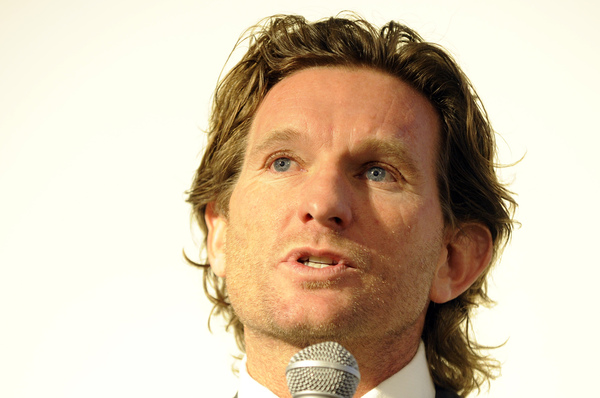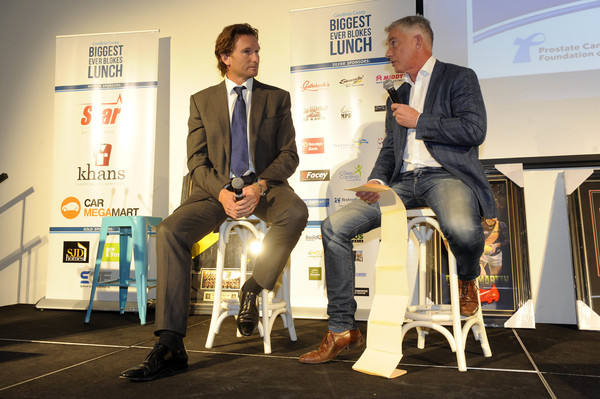
As a Bombers member and lifelong fan, Gazette sports editor Russell Bennett had been able to separate James Hird the player from James Hird the coach ever since the ‘Supplements Saga’ first surfaced. The former was this remarkable, mercurial, elegant, smooth-moving, courageous leader who set the standard across the competition. The latter was the other guy – the one intrinsically linked to the darkest chapter in the club’s history. But ‘remarkable’ isn’t the word to describe James Hird, the player or coach…
By James Hird’s own admission last Friday afternoon at the 2018 Cardinia Casey Biggest Ever Blokes Lunch – in front of a packed room of more than 500 blokes – the only remarkable thing about him was his footballing ability.
In a jaw-dropping presentation to a room full of people, many of whom have never been Essendon fans and would never dream of such a thing – given the tribalism of Australia’s game – Hird drew stone silence, and ultimately a rapturous standing ovation for his brutal, heartfelt truth about just how the past five years had affected him.
The whole Essendon saga had dragged the sport through the mud in most people’s eyes – including those of Bombers members – and on Friday Hird acknowledged his part in that.
“I will say that I’ve got a lot of responsibility for what happened,” he said when interviewed on stage by Bass MP Brian Paynter.
“I don’t want people to think that I’m not taking responsibility because as the senior coach of a football club when things happen like they did at Essendon where 34 players get suspended – for what I don’t believe was an illegal substance, I’m still very confident that wasn’t illegal – it’s wrong, and the tragedy is around the players. It’s not around the club.
“The players were the victims, in my opinion, and were treated extremely poorly.”
But the fatigue over the saga, itself, has long taken over the public conscious. Everyone’s sick of it.
Friday wasn’t so much about the darkest chapter in Essendon’s history, but more about how it affected one of its favourite sons. Still, those two things can’t be separated any more than James Hird the player, and James Hird the coach.
“People were highly critical of me trying to defend myself, of telling the story that was the truth, but in the end you get put in a position where you get accused with, in my mind, the worst thing you can do in sport (taking drugs),” he said.
”It’s abhorrent, and it’s wrong, so to be accused of being ‘the architect’ of the program – I’m not going to put up with that for the rest of my life, and I tried to defend myself.
“Where did that put me? It put me (in the position of) having for 365 days media out the front of my house, my kids being stalked by the media, my family being terrorised on a daily basis, people throwing rocks at the house, people knowing where we live, not being able to walk down the street, and the guilt associated with bringing that upon your own family and bringing that upon the club that you love, and affecting the supporters and also those 34 players took its toll.”
Hird’s mental health battle is remarkable in how it came to be, but certainly not in how he was affected. That battle could affect anyone.
Four years after the saga surfaced, Hird ended up in a psychiatric ward in Melbourne.
“I don’t know how many people here have been through depression, or had a brother, a sister, a wife, a mother, a daughter, a father or a friend who’s been through it – but it’s the worst illness you could get,” he said.
“I got my face smashed in Perth and got 10 metal plates through here and I almost lost my eye in 2002 from this knock, and I thought that was the most horrendous pain I could go through.
“They (basically) peeled my face off and put me back together (from the clash with team mate Mark McVeigh during a game against Fremantle).
“I’d go through that every day of the week before I’d go through the depression I went through.
“It feels like you’re at the bottom of a well and you’ve got bricks landing on your head day, after day, after day and it’s dark and you just can’t get out.”
Friday wasn’t a cry for sympathy from Hird. It was an appeal for understanding and support – for anyone with mental health struggles; a battle far greater than he ever faced on the footy field.
“If you know anybody (battling mental health issues), or you’re there yourself, you’ve got to rely on people and if you know people in that position go and help them – talk to them,” he said.
“They probably won’t ring you back. They won’t respond to you because they’re in such a dark place, but you have to help and keep contacting, and contacting, and contacting them.
“Having been through it, having been in intensive care at the Albert Road clinic where only my wife, my sisters, my kids and my mum could come and see me for two weeks – I was in a white room, and then out in general population for another three weeks – it’s a pretty stark reality of what people have to go through.
“I’m fortunate that I’ve got through it, and it was circumstance that put me there, but some people go through it their whole lives and have a day-to-day struggle.
“When you’re sitting in bed day after day and you can’t get out, and you can’t look at your kids and you hide from people – it’s bloody scary.
“(But) people who care for you can take you a long way, so my message here is that if you know someone (in this situation), give them a call and see how they’re going because in the end that might be the catalyst to start turning their life around.
“I’m happy to talk for as long about this topic to anyone publically in forums like this, privately, because there’s no stigma for me anymore. I understand it’s part of my journey and part of my life. Do I wish I hadn’t had to go through it? Yes. But it’s taught me a lot about myself.”
Anyone needing help can contact Lifeline on 13 11 14.







